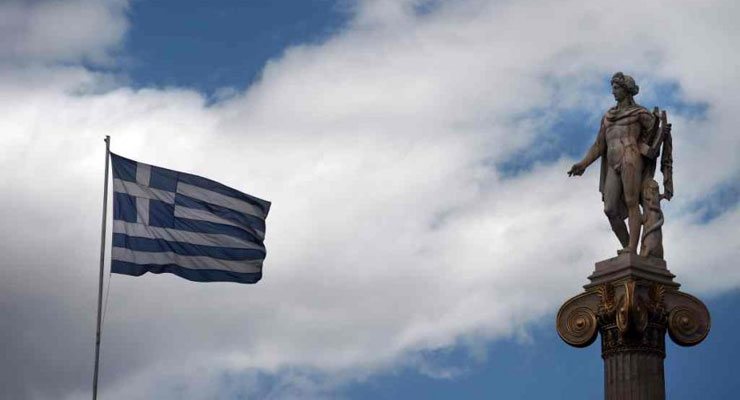Europe: “Grexit” – the risk that Greece will exit from the Eurozone and trigger a break-up of the single-currency club – has reappeared on the radar of global markets. Further east, Russia is escalating the conflict with Europe over the Ukraine – which is going to get worse. And across the continent, the political dominance of old elites is coming to an end with the rise of radical new parties.
Risk of Greece exit from Eurozone
Five years ago Greece was the focus of fear of a financial crisis. Now it’s the focus of fear of a European political crisis.
Then the risk was that this tiny nation would renege on its huge debts to German, French and other foreign banks and blow apart the Eurozone. That didn’t happen because of a massive effort by European governments.
Greece was not allowed a relatively-easy way out of the economic crisis brought about by the Great Recession – restoration of the old national currency, the drachma, cheap in terms of the euro, following exit from the Eurozone. Nor was it to be allowed the other relatively-easy option of default on its debts.
Instead, the old debts were refinanced, with much of the risk being passed from foreign banks to foreign governments. And it was made possible for Greece to continue borrowing, to give some underpinning to its economy.
The price was a tough “austerity” programme monitored by a “troika” of foreign official lenders — savage cuts in government spending, big tax increases, forced sales of state assets.
Much of that austerity was essential. It meant reducing lavish state benefits that Greece could not afford such as early retirement on state pensions. Ending much of the business of “jobs for the boys” in the public sector, and other corrupt practices. Forcing people to pay their taxes.
But there have been adverse consequences.
One problem with austerity policies throughout Europe is that they squeeze demand without doing much to stimulate economic growth.
Another is that their pain is focused on ordinary folk – work-seekers, small businessmen, retirees, indeed all those unable to hide their wealth or income – while counter-measures such as easy-money policies mainly benefit the elites of money and power.
In Greece more than half the young people of working age are without jobs. There have been savage cuts in the incomes of those who do have jobs. Finances of most families are under intense pressure.
After years of suffering, there are no signs of recovery, of an end to the pain.
Even after bail-outs and refinancing, the government’s foreign debt is still more than €300 billion, or about 180 per cent of GDP. Nearly half of all the new money that’s come in from the Eurozone and the IMF has been going straight out to service the foreign debt. It’s not for Greece, but its creditors.
The situation is politically explosive, and now it has exploded, with the election into government of Syriza, a Leftist party determined to ease the pain of austerity by insisting on a massive write-off of foreign debt, refusing to comply with the troika’s programme of reforms, and indeed reversing many of those reforms.
Syriza’s rise to power is symptomatic of a tidal wave sweeping across Europe of political opposition to the social and economic consequences of unification such as intensified immigration, centralization of power in European agencies, and devastation of traditional industries from globalization.
The euro, a currency in the hands of an unelected bureaucracy and beyond the control of individual Eurozone governments, is the most potent symbol of that increasingly-resented centralization… an easy target. Hostility to it is the one thing uniting forces of the radical Left and Right that have many strong disagreements among themselves on other policy issues.
It is a hostility that is growing across Europe. Syriza’s victory suggests that a similar and newer party in Spain, Podemos, could take power. In France the National Front’s Marine Le Pen is set to become a strong contender for the presidency. In Germany the fastest-growing challenger to the old dominant parties of Left and Right, Alternative für Deutschland, is based on hostility to the euro. In the Netherlands the anti-euro party leads in popularity, while in Italy two major opposition parties have swung towards anti-euro positions.
Britain was kept out of the Eurozone singlehandedly by the then finance minister Gordon Brown, but hostility to the larger grouping — the European Union — is the driving force behind the most destabilizing force in the nation’s politics, the UK Independence Party.
copyright: Martin Spring of OnTarget






















